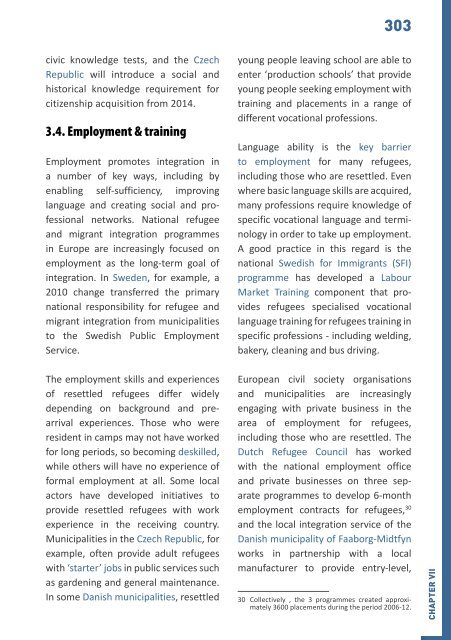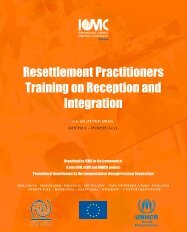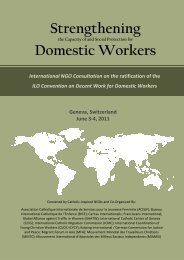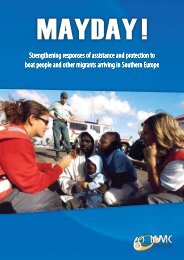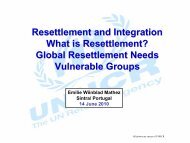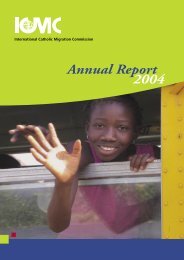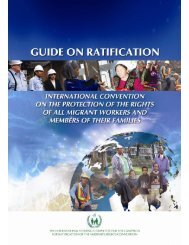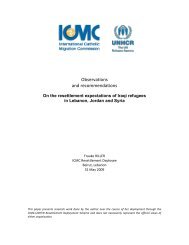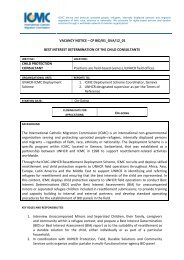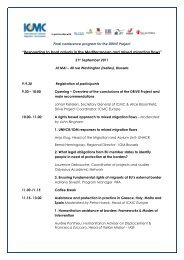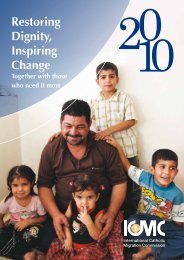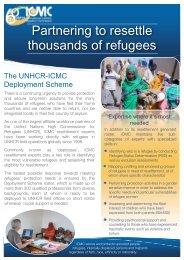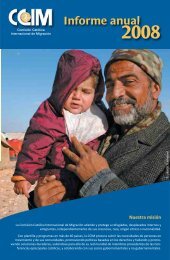ICMCEUROPE WelcometoEurope.pdf (5.89 MB)
ICMCEUROPE WelcometoEurope.pdf (5.89 MB)
ICMCEUROPE WelcometoEurope.pdf (5.89 MB)
You also want an ePaper? Increase the reach of your titles
YUMPU automatically turns print PDFs into web optimized ePapers that Google loves.
303<br />
civic knowledge tests, and the Czech<br />
Republic will introduce a social and<br />
historical knowledge requirement for<br />
citizenship acquisition from 2014.<br />
3.4. Employment & training<br />
Employment promotes integration in<br />
a number of key ways, including by<br />
enabling self-sufficiency, improving<br />
language and creating social and professional<br />
networks. National refugee<br />
and migrant integration programmes<br />
in Europe are increasingly focused on<br />
employment as the long-term goal of<br />
integration. In Sweden, for example, a<br />
2010 change transferred the primary<br />
national responsibility for refugee and<br />
migrant integration from municipalities<br />
to the Swedish Public Employment<br />
Service.<br />
The employment skills and experiences<br />
of resettled refugees differ widely<br />
depending on background and prearrival<br />
experiences. Those who were<br />
resident in camps may not have worked<br />
for long periods, so becoming deskilled,<br />
while others will have no experience of<br />
formal employment at all. Some local<br />
actors have developed initiatives to<br />
provide resettled refugees with work<br />
experience in the receiving country.<br />
Municipalities in the Czech Republic, for<br />
example, often provide adult refugees<br />
with ‘starter’ jobs in public services such<br />
as gardening and general maintenance.<br />
In some Danish municipalities, resettled<br />
young people leaving school are able to<br />
enter ‘production schools’ that provide<br />
young people seeking employment with<br />
training and placements in a range of<br />
different vocational professions.<br />
Language ability is the key barrier<br />
to employment for many refugees,<br />
including those who are resettled. Even<br />
where basic language skills are acquired,<br />
many professions require knowledge of<br />
specific vocational language and terminology<br />
in order to take up employment.<br />
A good practice in this regard is the<br />
national Swedish for Immigrants (SFI)<br />
programme has developed a Labour<br />
Market Training component that provides<br />
refugees specialised vocational<br />
language training for refugees training in<br />
specific professions - including welding,<br />
bakery, cleaning and bus driving.<br />
European civil society organisations<br />
and municipalities are increasingly<br />
engaging with private business in the<br />
area of employment for refugees,<br />
including those who are resettled. The<br />
Dutch Refugee Council has worked<br />
with the national employment office<br />
and private businesses on three separate<br />
programmes to develop 6-month<br />
employment contracts for refugees, 30<br />
and the local integration service of the<br />
Danish municipality of Faaborg-Midtfyn<br />
works in partnership with a local<br />
manufacturer to provide entry-level,<br />
30 Collectively , the 3 programmes created approximately<br />
3600 placements during the period 2006-12.<br />
CHAPTER VII


